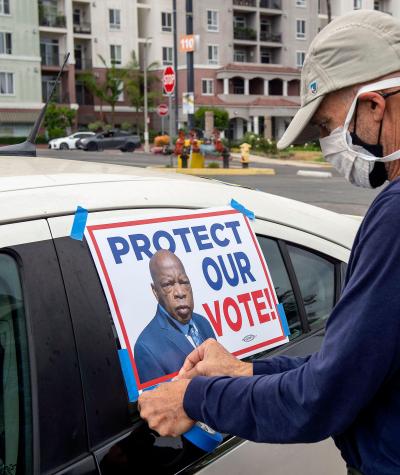It is time to restore and strengthen our freedom to vote by eliminating racial discrimination at the ballot box. Over the past decade, there has been an onslaught of racially targeted attacks against this freedom, which is why we need to enact federal legislation with national standards for voting access.
The U.S. Senate Committee on the Judiciary's Subcommittee on the Constitution took an important step toward this goal on Sept. 22, 2021 by holding a hearing on the John Lewis Voting Rights Advancement Act, otherwise known as S. 4 or the VRAA. This bill would restore key protections afforded by the 1965 Voting Rights Act (VRA).
The U.S. House of Representatives already voted to pass this bill in August.
During the hearing, there was discussion of how S. 4 would reinstate a preclearance formula, which would force jurisdictions with long histories of racial discrimination to submit proposed changes to their voting rules to the Department of Justice for review prior to their implementation.
Consequently, discriminatory practices would be identified before they could be implemented and disenfranchisement would be prevented before it could occur.
The preclearance formula used in the VRA was gutted by the U.S. Supreme Court in the 2013 case Shelby County v. Holder. Without the safeguards provided by the preclearance formula, voting access for communities of color has increasingly come under attack.
Following the Shelby County decision, many states have put in place measures restricting opportunities for voter validation, closing polling places and deleting voters from state voter rolls.
There have also been cutbacks to early voting periods and restrictions on the right of civic groups to assist citizens in participating fully in the democratic process.
These changes to voting rules have prohibited Black, Hispanic, Asian and Native American people from receiving or returning their ballots at disproportionately high rates.
Additionally, there was concern about the continued efficacy of the VRA in addressing voting discrimination after the Supreme Court’s recent decision in Brnovich v. Democratic National Committee, which has made it harder — though not impossible — to protect voters from racial discrimination nationally.
To address the many types of anti-voter laws that have sprung up in recent years, S. 4’s new coverage formula would specifically require federal oversight for each state that has had a history of freedom-to-vote violations in the last 25 years that would continuously update based on each states’ future conduct.
Under this new formula, Alabama, California, Florida, Georgia, Louisiana, Mississippi, New York, North Carolina, South Carolina, Texas and Virginia would likely be subject to preclearance.
Other provisions of the VRAA would mandate that states implement transparency protocols to inform their residents when voting laws in the state are changed and establish new voting protections for Native American tribal lands, like equal access to voter registration, polling places, early voting locations and mail-in ballots.
In 2021, we have seen time and time again why these protections for the freedom to vote are necessary as lawmakers in several states have enacted anti-voter measures creating deliberate barriers to the ballot box.
Campaign Legal Center (CLC) released a report in August grading states on the vote-by-mail and early voting laws that they had on the books at the end of their 2021 legislative sessions. Among other things, this report examined the racial impact of voting access laws implemented earlier this year.
According to the report, at least four states that passed restrictive, anti-voter laws in the first half of this year — Alabama, Georgia, Florida and Louisiana — would have been subject to preclearance if the John Lewis Voting Rights Advancement Act had been in place.
Another finding of the report was that with the exception of Maryland, the legislatures in states with the highest Black populations that changed their vote-by-mail and early voting policies each made changes for the worse.
Racially discriminatory laws cannot be allowed to continue to bar people from making their voices heard. Whether it is health care, education or our economy, all of us need to be able to vote to have a say in the key decisions that impact our lives.
The VRA has a long track record of earning overwhelming bipartisan support, as protecting voting access was a goal that transcended the political divide.
The Senate should come together and follow the House’s lead on approving the John Lewis Voting Rights Advancement Act to show its commitment to stopping future laws perpetuating voting discrimination in their tracks.
Whatever our color, background or zip code, in America we value our freedom. Now we must show that we cherish that freedom by moving to eliminate all racially discriminatory barriers to voting so that voters can pick their leaders.
